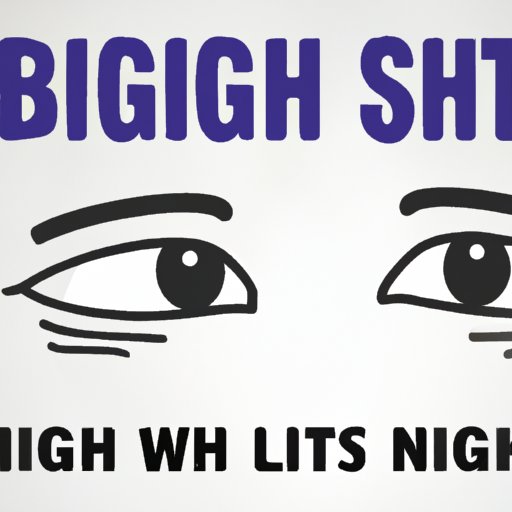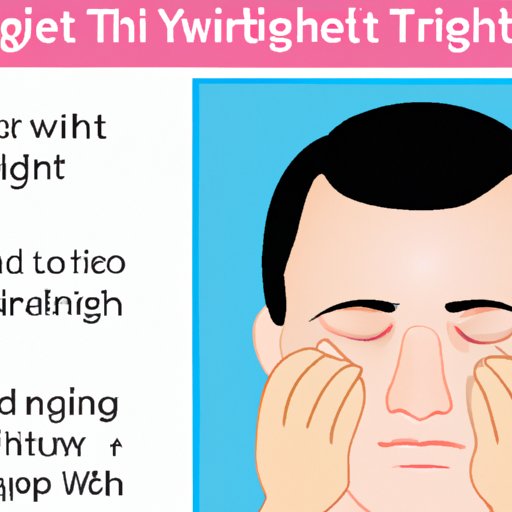Introduction
Eye twitching is an involuntary spasm of the eyelid muscles that can cause your eyes to blink or twitch uncontrollably. It’s a common condition that can affect anyone, although it’s more likely to occur in people who are under a lot of stress or suffer from fatigue. While it’s usually harmless, it can be irritating and annoying, so it’s important to know what you can do to stop it.

Identifying the Causes of Eye Twitching
Before you can treat your eye twitching, it’s important to identify the underlying cause. Some of the most common causes of eye twitching include:
Stress and Anxiety
Stress and anxiety can be major triggers of eye twitching. If you’re feeling overwhelmed or anxious, it can cause your eyelids to twitch. The best way to help reduce eye twitching caused by stress is to practice relaxation techniques, such as deep breathing exercises, meditation or yoga.
Lack of Sleep
Getting enough sleep is essential for good health and well-being. If you’re not getting enough sleep, your body may respond by causing your eyes to twitch. Try to get at least 7-8 hours of sleep each night to help reduce eye twitching.
Caffeine and Alcohol Intake
Caffeine and alcohol both have stimulating effects on the body, which can lead to increased eye twitching. Cutting back on your caffeine and alcohol intake can help reduce eye twitching.
Dry Eyes
Dry eyes can also cause eye twitching. Make sure to drink plenty of water throughout the day and use lubricating eye drops if needed. You should also avoid using air conditioning or fans, as they can dry out your eyes.
Nutritional Deficiencies
A lack of certain vitamins and minerals can also lead to eye twitching. Eating a balanced diet that includes plenty of fruits, vegetables, lean proteins, whole grains and healthy fats can help ensure you’re getting the nutrients your body needs.

Practicing Relaxation Techniques to Help Stop Eye Twitching
Relaxation techniques can help reduce stress and anxiety, which can in turn help reduce eye twitching. Here are some relaxation techniques to try:
Meditation
Meditation can help calm your mind and body, which can help reduce eye twitching. Try to meditate for 10-15 minutes each day to help relax your body and mind.
Deep Breathing Exercises
Deep breathing exercises can help reduce stress and relax your body. Try taking slow, deep breaths and focus on your breath as it enters and exits your body. Doing this for a few minutes each day can help reduce stress and eye twitching.
Progressive Muscle Relaxation
Progressive muscle relaxation is a technique that involves tensing and relaxing different muscle groups in your body. This can help reduce stress and tension, which can help reduce eye twitching.
Yoga and Tai Chi
Yoga and tai chi are both great forms of exercise that can help reduce stress and relax your body. Both can be done in the comfort of your own home, and can help reduce eye twitching.

Eating Foods That Can Help Reduce Eye Twitching
In addition to relaxation techniques, there are certain foods that can help reduce eye twitching. Try to incorporate these foods into your diet:
Leafy Greens
Leafy greens, such as kale, spinach and collard greens, are packed with vitamins and minerals that can help reduce eye twitching. They’re also high in fiber, which can help keep your digestive system running smoothly.
Nuts and Seeds
Nuts and seeds are a great source of essential fatty acids, which can help reduce inflammation and eye twitching. Try to incorporate nuts and seeds into your diet, such as almonds, walnuts, sunflower seeds, flaxseeds and chia seeds.
Omega-3 Fatty Acids
Omega-3 fatty acids are found in fatty fish, such as salmon and tuna, and can help reduce inflammation and eye twitching. Try to include omega-3 fatty acids in your diet at least twice a week.
Whole Grains
Whole grains are a great source of complex carbohydrates, which can help reduce eye twitching. Try to include whole grains, such as quinoa, oats, barley and brown rice, in your diet on a regular basis.
Adopting an Exercise Regimen for Eye Health
Exercise is not only good for your overall health, but it can also help reduce eye twitching. Regular exercise can help reduce stress and tension, which can help reduce eye twitching. Here are some types of exercise to try:
Regular Exercise
Regular aerobic exercise, such as walking, jogging, biking or swimming, can help reduce stress and tension, which can help reduce eye twitching. Try to exercise at least 30 minutes a day, five days a week.
Outdoor Walks
Going for a walk outdoors can be a great way to reduce stress and tension, which can help reduce eye twitching. Try to go for a walk outside at least 3-4 times a week for 20-30 minutes.
Weight Training
Weight training can help reduce stress and tension, and can help improve your overall health. Start off slowly and gradually increase the amount of weight you lift over time.
Seeking Professional Medical Treatment for Persistent Eye Twitching
If your eye twitching persists despite trying the above methods, you should seek professional medical treatment. Here are some steps to take:
Consult with an Ophthalmologist
An ophthalmologist is a doctor who specializes in the diagnosis and treatment of eye conditions. They can assess your symptoms and determine the best course of action.
Follow Prescribed Medication
Your ophthalmologist may prescribe medication to help reduce eye twitching. Follow their instructions carefully and take the medication as prescribed.
Take Supplements
Your ophthalmologist may also recommend taking certain supplements, such as omega-3 fatty acids or vitamin B12, to help reduce eye twitching. Talk to your doctor about which supplements may be right for you.
Conclusion
Eye twitching is a common problem that can be caused by stress, lack of sleep, poor nutrition, dry eyes and other factors. By identifying the underlying cause and implementing lifestyle changes, such as relaxation techniques, eating a balanced diet, exercising and seeking professional medical treatment, you can help reduce eye twitching and improve your overall eye health.
(Note: Is this article not meeting your expectations? Do you have knowledge or insights to share? Unlock new opportunities and expand your reach by joining our authors team. Click Registration to join us and share your expertise with our readers.)
